What Could Have Been? The Story of the 1994 Montreal Expos
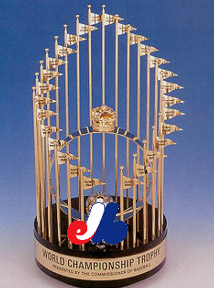
What Could Have Been? The 1994 Montreal Expos had the best record in baseball at the time of the strike.
Had Major League Baseball and the Baseball Players Association made some different choices 15 years ago, September 2009 might have been a great time to be a fan of the Montreal Expos. If I close my eyes, I can almost picture it.
The City of Montreal is a buzz for baseball with record crowds filling the new state-of-the-art downtown stadium to watch the Expos battle for another National League Eastern Division crown.
Fans are also excited to relive the memories from 15 years ago when the 1994 Montreal Expos forever solidified a place for baseball in Montreal with a thrilling run to a World Series title.
Indeed what a run it was.
After a slow start to the season that saw the team with a 4-9 record and already eight and a half games out of first place on April 18, manager Felipe Alou steadied the ship. They won five straight games to get back to .500 and after a loss to the Dodgers rattled off six straight wins and were soon heading toward the top of the division.
They secured sole possession of second place on May 11 and by mid July had overtaken the Atlanta Braves for the division lead and quickly started to pull away from their new division rival (the Braves moved from the NL West to the NL East as part of realignment in 1994).

Moises Alou emerged as an All-Star under the tutelage of his father, manager Felipe Alou
The 1994 Expos were a young, yet exciting team filled with talent and promise. The team had won 94 games in 1993 and would be satisfied with nothing short of a World Series title.
Among the position players, 28-year old third baseman Sean Berry was the oldest starter, though only in his second season as a regular.
The outfield consisted of three 27-year olds all destined for stardom.
Moises Alou, the son of the manager, was the budding superstar. In his third season, Alou enjoyed a breakout season in 1994 as he finished third in the MVP voting. He earned his first trip to the All-Star Game and returned to Montreal as a hero following his game-winning hit in the 10th inning.
Centerfielder Marquis Grissom was the table-setter for the potent Montreal offense. Since coming into the league in 1990, Grissom had provided a combination of speed, power and defense that made him an All-Star and MVP candidate.
Larry Walker had been with the organization since signing as a free agent in 1984. In his fifth full season, Walker had already won two Gold Gloves in rightfield and was emerging as an offensive force.
The rest of the lineup was filled with solid young players that seemed destined to help the Expos contend for years to come.
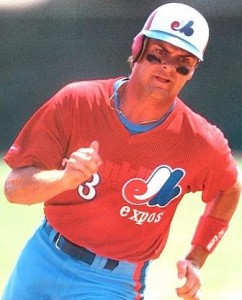
Larry Walker was signed by the Montreal Expos as a free agent in 1984. He spent five seasons with the team in the majors and by 1994 was emerging as a superstar. He went on to win three batting titles for the Colorado Rockies.
There was 21-year old Cliff Floyd at first base, 22-year old Wil Cordero at shortstop, 26-year old Mike Lansing at second base and 27-year old Darrin Fletcher behind the plate.
Berry and Lansing would end up as the only members of the lineup never to make an All-Star squad and both of them had solid major league careers.
The bench was even impressive as it included future All-Star outfielder Rondell White, veteran catcher Lenny Webster and slugging first baseman Randy Milligan.
Though not as young as the position lineup, the pitching staff had the perfect mix of experience and youth.
At 28-years of age, Ken Hill enjoyed the finest season of his career in 1994. He won 16 games and finished second in the Cy Young voting.
Since being acquired by the Expos from the Dodgers in a trade for Delino DeShields following the 1993 season, 22-year old Pedro Martinez had displayed glimpses of brilliance on the mound. Though in his first season as a major league starter, Martinez posted an 11-5 record and averaged a strikeout per inning.
In addition to the two staff aces, 31-year old Jeff Fassero, 25-year old Butch Henry and 23-year old Kirk Rueter gave the Expos a starting rotation that rivaled even the great Atlanta Braves in 1994.
The bullpen for the Expos was possibly even better than the starting staff.
With four of the primary relievers all 27-years old and the fifth one (Gil Heredia) a year older, the Expos had a bullpen that was merciless on opposing hitters.
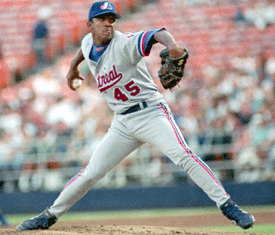
Pedro Martinez won 55 games and the 1997 Cy Young Awards in four seasons with the Expos. He won two additional Cy Young Awards after being traded to the Boston Red Sox.
Leading the way was closer Jeff Wetteland. In his third season with the Expos, Wetteland had saved 80 games in his first two seasons with the team and would add 25 in 1994.
Mel Rojas was an outstanding setup man for Wetteland and also took some of the pressure off of Wetteland as he could save games as well. He recorded 16 saves in 1994.
Tim Scott, Jeff Shaw and Heredia were all great situational pitchers who could fill the void on the rare occasions when the starters struggled.
Overall, the Expos staff tied Atlanta for the lowest earned run average in the league with a 3.57 mark.
By the time the team reached August 11th, they had the best record in baseball, as they were 34 games over .500 with a mark of 74-40.
And the fans of Montreal were starting to rally behind their team. A three-game home series against Atlanta in late June averaged nearly 44,000 fans per game and in their last two home series, the Expos averaged more than 34,000 fans per night in sets against the Dodgers and Cardinals.
However, the season and the building excitement could have been derailed at that point had not the owners and player’s union come together on a last-minute agreement to save the season and preserve the balance within the game.
Though a new minimum and maximum salary cap meant that small-market teams like the Expos, Oakland A’s, Minnesota Twins and Kansas City Royals had to guarantee a certain annual payroll, it also meant that larger-market teams like the New York Yankees, Boston Red Sox and Chicago Cubs could not spent whatever they wanted on player salaries and monopolize the free agent market.
Having the strike averted seemed to energize the Expos and they sailed into the postseason maintaining the best record in the game.
It was the first season of the new playoff structure with three division champions and one wild card team.
In the opening round of the playoffs the Expos easily defeated the Los Angeles Dodgers in three straight games while the Braves had little trouble with the Cincinnati Reds.
The showdown between the experienced Braves and the young Expos proved to be one for the ages.
With Hill, Martinez and Fassero standing toe to toe with Tom Glavine, Greg Maddux and John Smoltz, the pitching in the series was reminiscent to what had been experienced in the 1991 World Series between the Braves and Minnesota Twins when every hit, every base runner and every out had significance.
It took seven games, but Alou, Floyd and the Expos were able to thrill the full house crowd at the old Olympic Stadium with a dramatic victory to earn their first-ever trip to the World Series.
As the Florida Marlins would do nearly a decade later, the Expos faced the New York Yankees in a World Series battle that was being depicted by many as David versus Goliath.
Only this time David was launching missiles rather than rocks as though the Yankees were a solid team, there was little question that the primarily homegrown Expos had the better squad.
Overshadowing the talent of the Expos entering the series was the excitement by the New York media that Don Mattingly was finally making an appearance in the World Series after a decade of toiling away for uncharacteristically mediocre Yankee teams.
However, once the focus turned to the field it was the Expos that shined. After the grueling nature of the series with Atlanta many questioned if Montreal had enough left in the tank to defeat the Yankees.
However, that concern was refuted from the very beginning as the Expos thrilled the home crowd with dominating victories in the first two games of the series.
After winning one of three in New York, Montreal returned home and provided their home fans with the greatest thrill in sports, a clinching World Series victory.
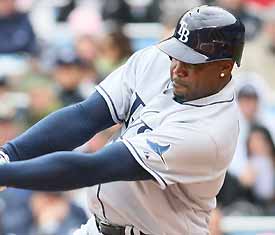
Cliff Floyd was a rookie for the Expos in 1994. After leaving Montreal following the 1996 season, he helped the Marlins win a World Series and in 2008 helped the Tampa Rays reach the Series.
The excitement in Montreal catapulted the city to grasp baseball fully as a sister sport to their beloved hockey and the city leaders became dedicated to keeping and expanding baseball in Montreal.
The downtown stadium that opened early in the new century would rival any other park in the league for its beauty and fan friendliness.
As I open my eyes, my clear vision of the 1994 World Series, the new stadium in Montreal and the excitement around the Expos starts to fade away.
What happened?
Alas, as we all know, the owners and player’s union did not come to an agreement on that fateful day in August of 1994 and though it would take another decade for it to officially happen, for all intents and purposes, baseball in Montreal ended the day the 1994 baseball strike began.
Instead of enjoying their first World Series Championship, the management, fans and players associated with the Expos had to deal with the reality that their dream season had been snatched away.
When baseball did finally return in late-April of 1995, the Expos were not the same.
Gone from the lineup were Larry Walker and Marquis Grissom. The team also was without staff ace Ken Hill and closer Jeff Wetteland.
Ironically, the Expos would win eight less games in a 144 game 1995 season than they did in a 114 game season the previous year.
While Montreal was struggling to a record of 66-78, Grissom was earning a World Series ring in Atlanta and Walker was leading the Colorado Rockies to the playoffs. Wetteland would win a World Series with the Yankees in 1996 and after leaving the Expos, Alou claimed a ring with the Florida Marlins in 1997.
By 1998, the Expos had a completely new team as none of the position starters or primary pitchers from the great 1994 squad were still on the team.
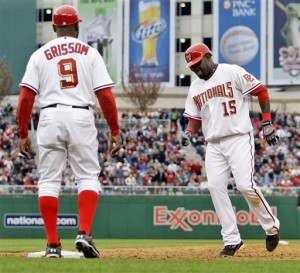
Former Montreal Expos great Marquis Grissom is now a coach with the Washington Nationals.
In 2005, baseball left Montreal for good as instead of playing in a new stadium in downtown Montreal, the franchise had to move to Washington, DC to find a new facility. Now known as the Washington Nationals, the franchise plays their home games in a new stadium in Washington, but still struggle on the field and for crowd support.
The Nationals posted an 81-81 record in their first season in Washington, but have had a losing record each of the last four seasons and in 2009 are averaging only 22,740 fans per game. That figure is less than the 24,543 the Expos were averaging at the time of the strike in 1994, but significantly better than the 10,285 that the team averaged in their final five seasons playing in Montreal.
While the Expos are undoubtedly the most notable casualty of the 1994 labor dispute, the agreement that led to baseball’s return has also seriously hampered a number of other baseball franchises.
Between 1950 and 1994, only four teams (1953-1962 Chicago Cubs, 1953-1967 Kansas City Athletics, 1969-78 Montreal Expos and the 1977-1990 Seattle Mariners) registered periods of 10 or more consecutive losing seasons and two of those four were expansion teams.
Since 1994, five franchises (1993-2009 Pittsburgh Pirates, 1993-2004 Milwaukee Brewers, 1994-2005 Detroit Tigers, 1998-2007 Tampa Bay Rays and the 1998-2009 Baltimore Orioles) have registered stretches of 10 or more consecutive seasons with a losing record. In addition, the Kansas City Royals have had a losing record in 14 of the last 15 years (winning mark in 2004 interrupted their streak), the Cincinnati Reds are working on their ninth straight losing season and the Colorado Rockies are currently experiencing only their second winning season since 1997.
While baseball as a whole has grown significantly stronger since 1994, this statistic illustrates that there are clearly places where the agreements reached in 1994 have hampered the ability to compete in an era of spiraling salaries and unbridled spending by the largest franchises.
The Expos were the first direct casualty of the 1994 baseball strike, but they may not be the last.
Excellent article. I firmly believe that MLB & MLBPA killed the Expos. Although not an Expos fan I was very sad to see them leave Montreal. I even went to Montreal during their last season to see a game at old Olympic Stadium. And you are correct, the current baseball financial imbalance is destroying several once proud teams.
Very good article.
Just one correction on the Pedro Martinez picture caption – he won his first Cy Young with the Expos in 1997 (with his other 2 as a member of the Red Sox).
Thanks, I got my years confused when looking at the years of his awards. Appreciate the edit.
As a life-long Yankee fan… and as someone who went to a few Expo games (growing up 3 hours from Montreal)… just thinking about 1994 still ticks me off. I thought for sure it would be Yanks/Expos and I might get a crack at seeing a WS game live and in person.
If the team ever built that downtown stadium, who knows… maybe the team would still be there, but I think the stadium was the key, Olympic Stadium was a dumpster fire.
Either way, MLB continues to screw up its own sport. No minimum salary cap, World Series games that haven't seen sunlight in 20 years, over-expansion, turning a blind eye to steroids till it was too late… add it all up and you've got your answer.
Thanks for the post. Good information for me.
Great article! White Sox are my favorite team but I did like the Expos as my second favorite. I disagree with your yankees theory. White Sox had a great team and I think the Seattle Mariners would have over taken the Texas Rangers in the AL west that year only being 3 games back of Texas and the Mariners were on quite a run when they went on strike. It makes me sick the imbalance of the saleries today and seeing great baseball towns like Kansas City, Pittsburgh, & Baltimore being reduced to good minor league teams having to compete with the yankees, red sox and angels payrolls. Its hard to watch baseball today.
Hello, I just hopped over to your web page through StumbleUpon. Not somthing I might typically browse, but I liked your thoughts none the less. Thank you for creating some thing worthy of browsing.
I salute to the admin of this blog. I really like and I will surely recommend this blog to my friends.
Hi,
Could you please write me at [email protected] i would like to talk to you
Thanks
As a result of the need in controlling and regulating industry through both direct and indirect methods, two
steps must be carried out. It provides comprehensive solutions to
every accounting problem related to your business.
As an Accountant with an MBA Degree in you will be able to use your skills to analyze
a company.
My web blog; charles brandon Fort Lauderdale CPA supplies
Please know that being exposed to the sun on a continuous basis will not only accelerate of the
skin’s aging process, and will also increase your risk
of getting variety of life endangering health conditions such as skin cancer.
Today the fake tan industry is a part of the cosmetics industry.
Fake tan is nothing but a cream, lotion or a spray containing tan color which should be applied all over your
body to get those sensuous tanned looks. Fake Bake is so great that it has been featured in countless publications and used by
celebrities like Madonna and Britney Spears. Y: You should
keep skin moisturized on days you aren’t tanning. Avoid
wearing bra, knickers, socks and other tight fitting clothing
immediately after applying the tan. This allows you to purchase
your items at a cost that is extremely affordable, without
having to worry about being middle manned, and paying extremely expensive prices when you could
be getting it cheaper. It may sound scary but what if someone is injured
and it. Most sunless tans contain DHA, which is not a dye,
or paint. By placing a bulk order, you can also avail of
a considerable discount in the overall cost.
Feel free to visit my site; spray tanning machine
Furthermore, feeding live food is difficult as all live meals
have a much higher risk in bringing bad bacteria or microorganisms that maybe harmful to your fish.
Wherever you go, different rules may apply, and some of them will be regional only.
So, you will be guided accordingly and will learn better and faster.
my page: dunnage pictures of box braids hairstyles
For a start, they have a short product life cycle, from product
development to marketing. You can assume from this that they take
themselves seriously and you can probably do
the same too. They provide you the moving service in all aspects and they provide the following services such as local moving, long distance moving, corporate moving,
piano moving, storage facilities, packing services and order boxes.
My web site; natural gas storage business model
If you have never looked at belly dancing jewelry online then check it out.
There are fourteen typefaces that have a special significance to PDF documents:.
Your body will be moving in ways you are not used to, and you don’t want to be flashing
too much skin to those around you.
Take a look at my blog – pelvic floor exercises nhs patient information leaflets
Other people, who choose yoga that is more energetic or demanding, get more energy from deep
colors like crimson or emerald green. There are fourteen typefaces that have a special significance to
PDF documents:. This keeps your track moving and in motion, and it keeps your listeners attention.
Feel free to visit my page; yoga pants capri for kids
Even frequent blow-drying at extreme heat or brushing
obsessively can cause your hair to become extremely fragile causing it to break and fall out.
When too much pressure is put on the hair over time it can speed
up the hair shedding process, resulting in the loss
of hairs already in the telogen phase. However, pulling on a scab that was adherent to the skin usually
dislodged the graft – often several days after pulling on a hair was safe.
Here is my homepage: does igrow laser work
Asia-Pacific Exhibition 2008 printing supplies more than 300 exhibitors of supplies, it also reflects the “337 Case” general supplies for domestic manufacturers
is gradually dispersed cloud caused, general supplies in the market
competition will become more intense. Coppertone Sunless Tanning came in a gradual tan moisturizing lotion for a
flawless natural-looking tan you control 9 fl. Back when I was 15 to 20
I tried every Summer to get the greatest suntan ever and
I used to tell my buddy Darin White and I would one day write a book
about how to get the best suntan.
Feel free to surf to my webpage – chloe sims false Castor oil for eyelashes Before and after
Before rushing into any financial decision, research all the options available and
find what payment option is best for you. With these
facts, it became apparent that no matter how great these cabinets looked
— I was not going to buy something made of particle board.
If the cost estimates are too low, the project will go over budget –
sometimes significantly so.
Feel free to surf to my web site bathroom cabinets pompano beach fl
They want you to come to the salon on a regular basis so they
tell you that you need to get a haircut every four to six
weeks, but it’s just a way for them to make more money.
Redheads and folks with course hair will typically be higher shedders than blondes or those with fine hair.
Any cosmetic plastic procedure could be a worthwhile and extraordinary experience for both the patient and surgeon, if this is done in the
light of surgical standards in term of safety.
My blog: hair growth products for men reviews
This will help you in selecting the company on the basis of the services offered and also on the cost they charge.
The above talked about three methods to move Favorites in Internet
Explorer 9. Providing assistance to customers who are trying to relocate is the responsibility of the customer service reps.
my site :: moving companies in Indianapolis In
At the recent TRIC Awards in London, model and reality TV
star Amy Childs showed off her stunning figure in a white and red bodycon dress
and red heels. The woman has her hand on her face, and that face is lined
with worry. It now encompasses everything from women’s clothing to eyewear to underwear to tailored
suits.
Feel free to surf to my blog post – bandage dress uk Cheap
Still, you can get all of the things you need for doing the h – CG weight loss protocol for around $100 or
less. First Response Early Results home pregnancy test is
the most sensitive, cost effective, $12. However you will not know until
you check it out yourself.
Also visit my web-site – weight loss with hcg diet
Comfort comes in the form of the beautifully upholstered reclinable deck seats and bow
seats, and a drive. If you like antiques you
have to ask for help- we have many but only the locals
know where they hide. Be sure to vacuum floors,
rugs and upholstery your pet comes in contact with regularly.
My blog post … duck box plans design
Of course you can get low cost tanning lotions elsewhere, but the results may not be what you expect;
the professional lotions guarantee certain results. Therefore, there is
no risk of cancer, skin rash, and many other allergies that you can catch by exposing your sensitive skin to
the elements. My personal preference having used both mediums is the
lotion, or the sunless tanner spray, sprayed on and then rubbed in.
Review my web site – deer antler spray facts
In the library, you’ll be able to view the names in the files.
This is only a precaution how the material isnt attached with a cookie
as part of your internet cache. Traders seeking online opportunities to
earn additional income,but most with the time struggling to find a reliable and convenient business online due for the fact that online
income opportunities need large investments and charge commission on trade dealings utilize Forex Striker,
that is becoming more and more popular due to its market liquidity.
Right away I am going away to do my breakfast, later than having my breakfast coming
yet again to read other news.
Sims Lifetime Happiness score. This Lifetime Happiness points used by the player to purchase rewards of life, and are available for most platforms, including Microsoft Windows PC. PES 2015 Torrent you can download from our website torrent2k.
http://www.torrent2k.com/sims-3-torrent/
WOw, I didn't realize how many storylines there were that year!
Very creative. I always wait for your posts from.
Wow amazing post you are doing very nice job.
he content is providing how to use this features and group deal sites also.
Bookkeeping Programming has made doing our funds significantly simpler. It's not just more reasonable than utilizing a genuine bookkeeper, you can be sure that every one of its computations are exact. No compelling reason to stress over erroneous calculations for you can make sure that the figures it will appear on your screen are right. Utilizing a private bookkeeper might be too exorbitant for some particularly to the individuals who are quite recently beginning up their own particular organization. It's a practical procedure that ensures speedy outcomes in only several ticks. The bookkeeping programming was created by PC architects to make the errand of bookkeeping less demanding and less convoluted. Envision having to just take a seat in your office and consider new business hones instead of worrying about every one of your accounts. All computations for your expenses, or commitments will be finished by the product program making your employment significantly simpler.
I would love to see the expos back in Montreal. A rivalry in the AL East with Boston, new york, and especially Toronto would be amazing. Hopefully it happens in the not to distant future.
Nice post,,,thanks for sharing.